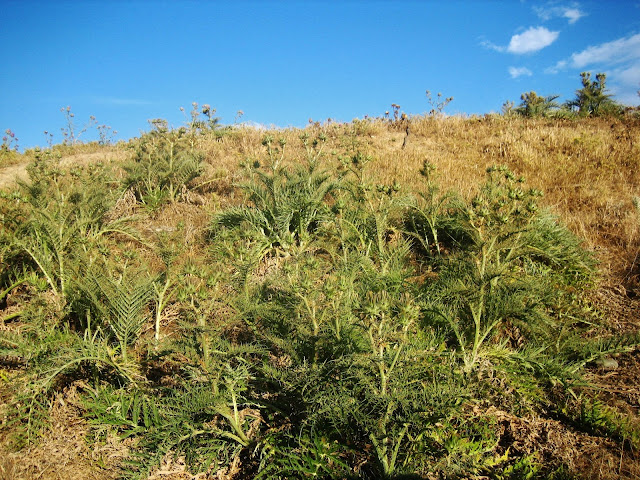
 The cardoon (Cynara cardunculus), also called the artichoke thistle, cardone, cardoni, carduni, or cardi, is a thistle-like plant in the sunflower family. It is a naturally occurring species that is sometimes considered to include the globe artichoke, and has many cultivated forms. It is native to the western and central Mediterranean region, where it was domesticated in ancient times.
The cardoon (Cynara cardunculus), also called the artichoke thistle, cardone, cardoni, carduni, or cardi, is a thistle-like plant in the sunflower family. It is a naturally occurring species that is sometimes considered to include the globe artichoke, and has many cultivated forms. It is native to the western and central Mediterranean region, where it was domesticated in ancient times.
The wild cardoon is a stout herbaceous perennial plant growing 0.8 to 1.5 m (31 to 59 in) tall, with deeply lobed and heavily spined green to grey-green tomentose (hairy or downy) leaves up to 50 cm (20 in) long, with yellow spines up to 3.5 cm long. The flowers are violet-purple, produced in a large, globose, massively spined capitulum up to 6 cm (2 in) in diameter.
It is adapted to dry climates, native across an area from Morocco and Portugal east to Libya and Greece and north to France and Croatia; it may also be native on Cyprus, the Canary Islands and Madeira. In France, it only occurs wild in the Mediterranean south (Gard, Hérault, Aude, Pyrénées-Orientales, Corsica). It has become an invasive weed in the pampas of Argentina, and is also considered a weed in Australia and California.
In cultivation in the United Kingdom, this plant has gained the Royal Horticultural Society's Award of Garden Merit.
Photos Charzia 4/6/2015 by George Konstantinou






No comments:
Post a Comment